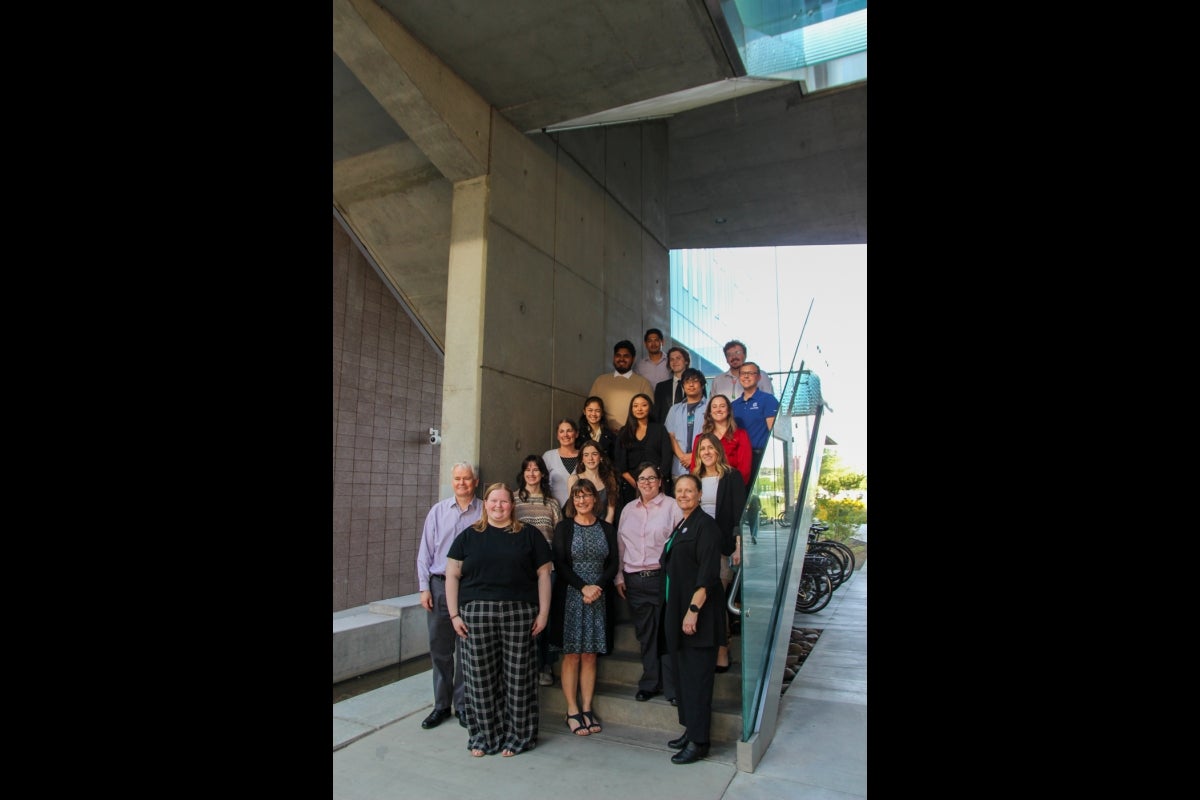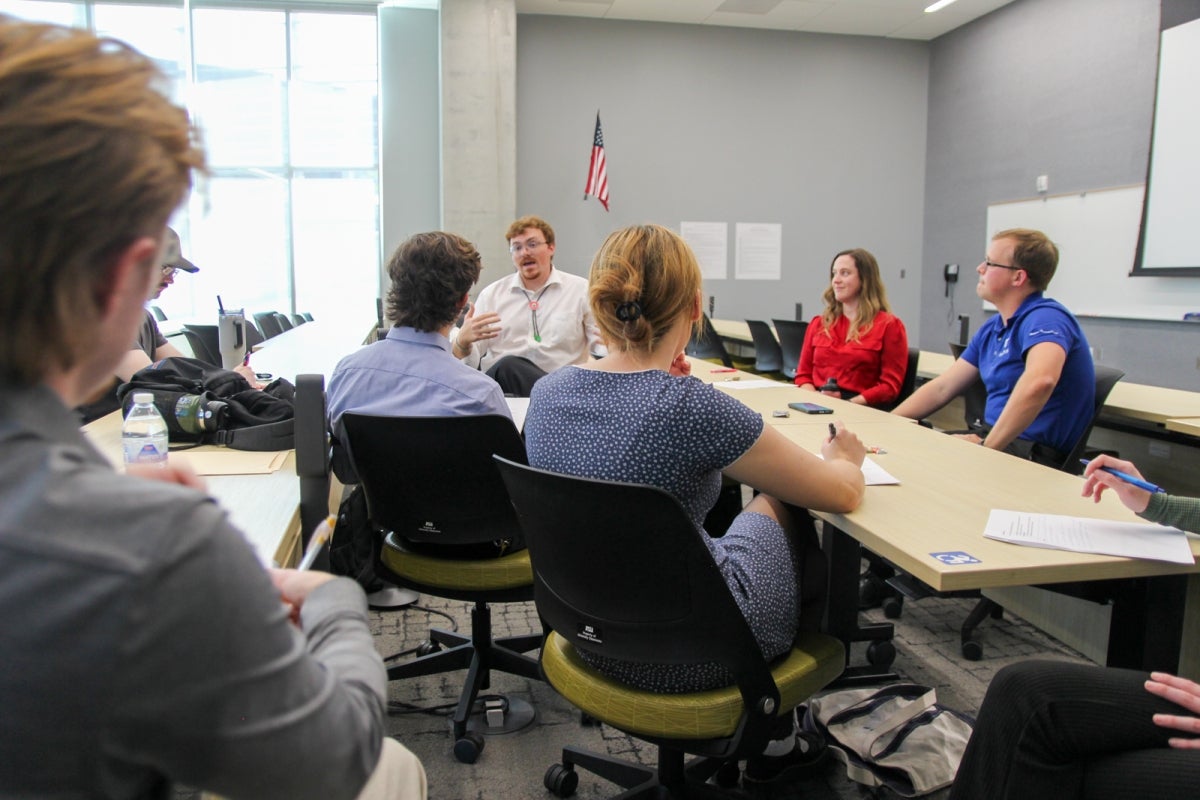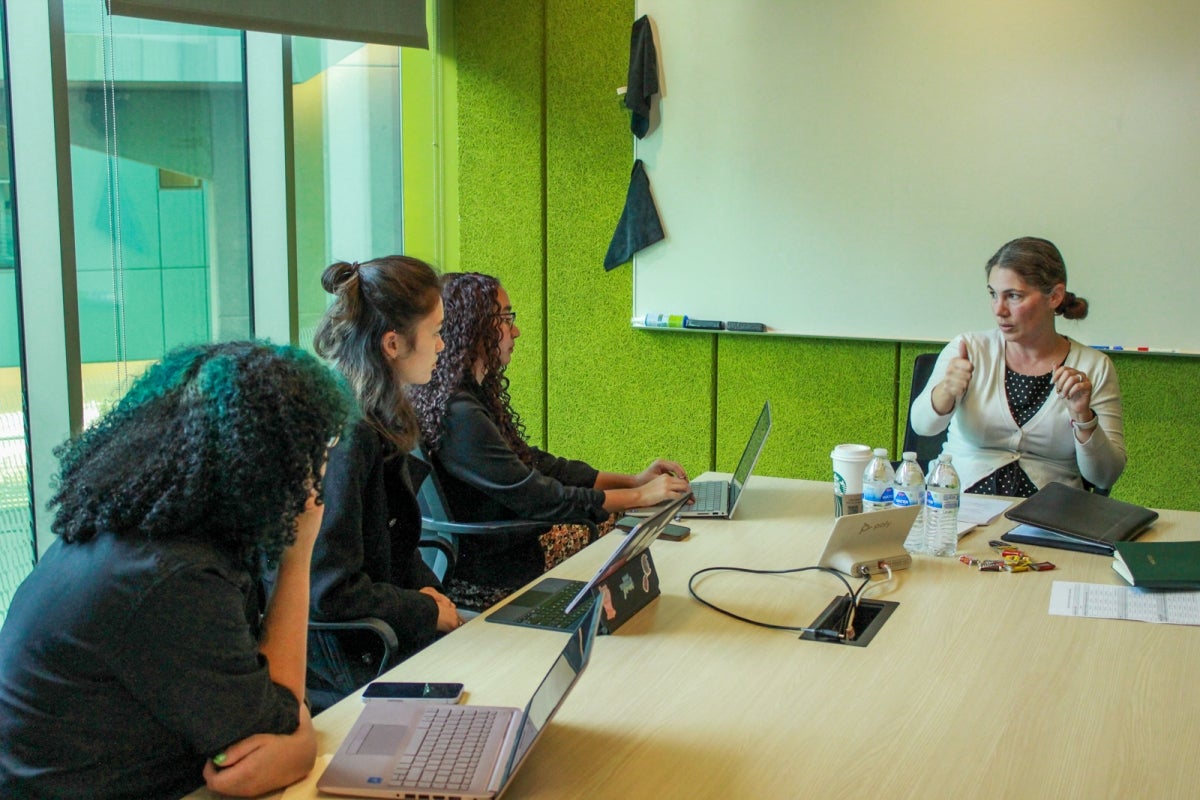ASU students gain insight into sustainability careers in local governments

Sustainability students interview electric vehicle program manager for the City of Phoenix, Karen Apple. Photo courtesy of Matt Oxford / College of Global Futures.
What does it take to build a sustainable, thriving future for all? A resilient community requires a dedicated workforce of trained professionals, committed to driving meaningful change that meets the needs of the people they serve.
Despite the challenges that arise in the public sector, municipal governments across Arizona are working at the local level to craft sustainability strategies and implement initiatives that support, strengthen and build resilience in their communities.
Although, the increasing need for support from a skilled workforce limits their capacity to scale up programs.
Many of Arizona’s local governments are beginning to address this gap by investing in the next generation of leaders through the Sustainable Cities Network (SCN) within the Julie Ann Wrigley Global Futures Laboratory. Through their relationship with SCN, Arizona cities and municipalities are able to gain localized support from the university to improve and expand sustainability strategies, engage in knowledge sharing and allow sustainability practitioners to network directly with ASU students, faculty and staff.
Alison Almand, a program coordinator for the Sustainable Cities Network, clarified the role of SCN.
“The Sustainable Cities Network serves as a 'connector' for the university and local municipalities,” said Almand. “The relationships with Arizona cities and towns have been built over 16 years through its educational programming. The Network aims to meet communities where they are in their sustainability journey by providing consistent convenings through its workgroups and special meetings.”
Building the Network with students
Last fall, the Sustainable Cities Network partnered with a course from the School of Sustainability, an academic unit of the ASU College of Global Futures, to provide a distinct opportunity for sustainability professionals working in local municipalities to network directly with students.
In one section of SOS 232: Professional Skills in Sustainability Practice, a required course for the sustainability bachelor’s degree curriculum, students had the opportunity to engage with municipalities across Arizona to learn directly from sustainability practitioners what it’s like working in the field, what skills they’ll need and how they can best prepare for their career.
Throughout the semester, the students worked to develop a database of professionals applying sustainability in practice everyday and documented the sustainability strategies employed by each municipality. This database would be used to support the Network’s activities and outreach.
Additionally, SCN helped coordinate a roundtable exercise where students conducted interviews with municipal staff from Phoenix, Avondale, Peoria, Flagstaff, Mesa and Tempe to help inform workforce development needs, in service towards the Network’s activities with the Southwest Innovation Sustainability Engine (SWSIE). Through the roundtable interviews, each student had the opportunity to directly network with sustainability practitioners and learn about how they can best prepare to enter the field as early-career professionals.
“Providing students the opportunity to interview the sustainability ‘do-ers’ in our local cities provides students with the chance to see how sustainability is actualized outside of the classroom, and in their everyday lives through their local communities,” said Almand.
Through this course, each student had the opportunity to develop their communication, interpersonal, project management and strategic planning skills, as well as build their own networks and make connections across the different fields of sustainability.
“Employers in the sustainability sector are often more interested in candidates who demonstrate a genuine commitment to driving positive change, a willingness to learn, and adaptability,” said Evan Shores, a third year sustainability student.
Shores continued that these interactions made her greatly optimistic about the growth trajectory of the sustainability sector. Multiple students expressed excitement at the opportunity to engage in a robust community and contribute to that growth.
“[B]y navigating challenges as a dynamic team, the work not only gets done, but doesn't overwhelm individuals and creates an improved product,” said Maxwell Kandas, a second year student majoring in sustainability with a minor in project management and sustainable foods and farms.
The power of action and connection at the local level
Building a thriving future requires us to understand the complex puzzle of systems that comprise the cities and communities we rely on. The public sector helps connect the individual pieces required to comprehend the whole picture, and sustainability is essential to transforming the image into the future we all deserve.
Laura Hyneman, deputy director of the Environmental and Sustainability Department in the City of Mesa and a member of SCN, spoke to diverse applicability of sustainability.
“Working in local government puts you on the front line of addressing climate and environmental challenges, including air quality, urban heat, water scarcity, reducing GHG emissions, resilient buildings, the list goes on,” Hyneman said. “Sustainability principles apply to just about every career in every municipal department.”
At the municipal level, sustainability professionals are able to intervene with localized, community-specific responses. Karen J. Apple, the electric vehicle program manager for the City of Phoenix and member of the Network, shared about the opportunity to make an impact in local communities.
“Government [agencies] have a lot of checks and balances and may move slower than the private sector, but we have an opportunity to make real change at the local level when you are employed by a local government,” Apple said.
These opportunities to create change and put sustainability into practice speak to the importance of engaging students in the power of local action, and in turn builds capacity in our workforce to support that change.




